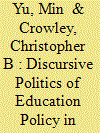| Srl | Item |
| 1 |
ID:
173459


|
|
|
|
|
| Summary/Abstract |
This article explores the discursive functioning of education policies, bringing into consideration community perspectives regarding policy enactment in contemporary China. With the intention of building upon ongoing discussions surrounding both the conceptions and purposes of policy sociology, we critically analyse policies directly related to the education of migrant children living in and around China's largest urban centres, with a specific focus on those implemented in Beijing. We emphasize two important aspects that previous studies of China's education policies have tended to underplay given their focus on social-economic perspectives. The first argument is that education policies have an underlying agenda that extends beyond that of simply addressing the educational needs of migrant children – evidenced through the discursive functions of policy texts. The second argument is related and seeks to raise questions about who is best served by these policies and for whom these policies are intended.
|
|
|
|
|
|
|
|
|
|
|
|
|
|
|
|
| 2 |
ID:
147416


|
|
|
|
|
| Summary/Abstract |
Since the reform and opening up in 1978, China has begun a period of rapid industrialization and urbanization. Along with an increasing number of rural people migrating to urban area for jobs, there are a considerable number of elderly parents left behind in the rural area. The impact of migration of the adult children on the health of their left-behind parents is ambiguous. On the one hand, the additional income from the children's jobs can allow their parents to afford better health care and nutrition; on the other hand, the migration necessarily reduces the amount of time the children have to take care of their parents. This paper uses the Rural Urban Migration in China data to empirically investigate the effect of adult children's migration on the health of the left-behind parents. Based on a linear probability model with instrumental variable correction, we find that having one additional adult child migrated to an urban area increases the probability of the left-behind elderly parents being in poor health condition by about 8%. Furthermore, parents having only one child, from low-income households, or aged above 60 year are affected more. Our results point out that the parents with only one child is the most vulnerable group and highlight the importance of establishing a formal care system for the rural elderly to complement the traditional family care in rural China.
|
|
|
|
|
|
|
|
|
|
|
|
|
|
|
|
| 3 |
ID:
161883


|
|
|
|
|
| Summary/Abstract |
We use a unique, self-collected dataset to study the trade-offs between rural land holding and urban hukou facing Chinese rural households. Exploring the criteria used in the initial land allocation in the early 1980s, we argue that our finding of a negative relationship between land holding and permanent migration in terms of hukou change has a causal interpretation. We also contribute to the literature by empirically examining the impact of land holding on temporary and permanent migration decisions simultaneously. We find that land holding reduces the likelihood of permanent migration but has a smaller effect on temporary migration decisions. Using a hypothetical survey question, we find that providing full access to urban social benefits to even “landless” households would result in only a moderate increase in the number of rural individuals intending to settle permanently in urban areas. Our results suggest that reforms of rural land rights and urban social benefits alone may not be sufficient to attract a large proportion of rural individuals to permanently settle in urban areas.
|
|
|
|
|
|
|
|
|
|
|
|
|
|
|
|